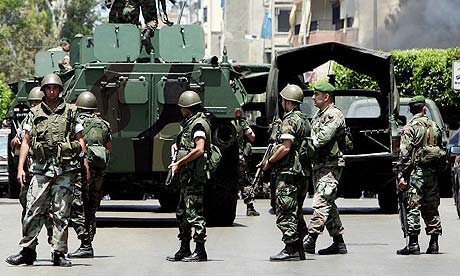 BEIRUT, Lebanon – The Lebanese army expanded its troop deployment to several tense areas around the country Tuesday, saying its soldiers would use force if needed to impose order. The army has played a central role in defusing the violence that started last Wednesday by calling on armed supporters from both sides to leave the streets. But it has remained neutral in the conflict and did not intervene. The army’s announcement signaled that it could step up its involvement to bring an end to the country’s worst internal fighting since the end of the civil war. Army units will prevent any violations, whether by individuals or groups, in accordance with the law even if this is going to lead to the use of force," said an army statement released late Monday. One reason the army had largely stayed out of the fighting was the fear that its forces could break apart along sectarian lines as they did during the civil war. The army statement said troops would prevent armed civilians from roaming the streets and called on all groups in the country to cooperate. Streets in the capital were busy as more businesses opened, but schools and universities remained closed. Also, many roads were still blocked including the highway leading to the country’s only international airport. The tense areas where troops deployed early Tuesday included the northern city of Tripoli that witnessed heavy clashes the day before. The army also continued its deployment in the mountains overlooking Beirut and several neighborhoods in the capital.
BEIRUT, Lebanon – The Lebanese army expanded its troop deployment to several tense areas around the country Tuesday, saying its soldiers would use force if needed to impose order. The army has played a central role in defusing the violence that started last Wednesday by calling on armed supporters from both sides to leave the streets. But it has remained neutral in the conflict and did not intervene. The army’s announcement signaled that it could step up its involvement to bring an end to the country’s worst internal fighting since the end of the civil war. Army units will prevent any violations, whether by individuals or groups, in accordance with the law even if this is going to lead to the use of force," said an army statement released late Monday. One reason the army had largely stayed out of the fighting was the fear that its forces could break apart along sectarian lines as they did during the civil war. The army statement said troops would prevent armed civilians from roaming the streets and called on all groups in the country to cooperate. Streets in the capital were busy as more businesses opened, but schools and universities remained closed. Also, many roads were still blocked including the highway leading to the country’s only international airport. The tense areas where troops deployed early Tuesday included the northern city of Tripoli that witnessed heavy clashes the day before. The army also continued its deployment in the mountains overlooking Beirut and several neighborhoods in the capital.
President Bush expressed his support for the Lebanese army on Monday during an interview with Al-Arabiya television, saying Washington would continue to supply and train the country’s forces. "We want to make them better so they can respond," Bush said. The president confirmed that the US military has moved the destroyer USS Cole off the coast of Lebanon but said it was "part of a routine training mission that had been scheduled a long time before." Army commander Gen. Michel Suleiman is the consensus candidate for president and the army’s success in calming violence in the country could enhance his chances of being elected. Bush said in his interview that the U.S. would continue its support for the Lebanese government and keep up pressure on Iran and Syria, The president also called on Arab nations to support Lebanese Prime Minister Fuad Saniora. Arab foreign ministers met in Egypt on Sunday and pledged to send a delegation to Beirut to help find a solution. The delegation was expected in Beirut on Wednesday. Lebanon’s Sunni Muslim leader Saad al-Hariri pledged on Tuesday there would be no political surrender to what he called a bid by Hezbollah and its Syrian and Iranian backers to impose their will on the nation by force. They simply are demanding that we surrender, they want Beirut to raise white flags… This is impossible," Hariri told a news conference in his first public appearance since Hezbollah swept through Sunni-dominated areas of the capital last week. "They will not be able to obtain Saad al-Hariri‘s signature … on a deed to surrender to the Iranian and Syrian regimes." Lebanon experienced its calmest day since violence broke out on May 7 after U.S.-backed Prime Minister Fouad Siniora outlawed Hezbollah’s communications network and fired Beirut airport’s security chief. Hezbollah said this was a declaration of war and swiftly took over much of Beirut, crushing pro-government Sunni Muslim gunmen. It then handed over its gains to the army. Saudi Arabia said that if Iran endorsed Hezbollah’s actions it would affect the Islamic Republic’s ties with the Arab world. "Of course, for Iran to back the coup that happened in Lebanon … will have an impact on its relations with all Arab countries," said Saudi Foreign Minister Saud al-Faisal. said al-Faisal ‘s claims of Iranian support for Hizbullah’s recent actions in Lebanon were made in anger. Iranian President Mahmoud Ahmadinejad denied his country was meddling in Lebanon. According to Ahmadinejad, the Saudi Foreign Minister was not following the orders of Saudi King Abdullah. The Iranian leader conveyed Iran is the only country that does not interfere in Lebanon’s internal affairs.French Foreign Minister hinted at a possible U.N. Security Council resolution on Lebanon. "A resolution, which is still not entirely complete, could be proposed to the Security Council," Kouchner told parliament.
There is no civil authority in the country now, so the army is under tremendous pressure," said Timor Goksell, a security expert and former spokesman of UN peacekeeping forces who coordinate with the military in south Lebanon. "If they had used their weapons during the clashes, tomorrow there would be no army and no country." But Goksell said the army’s pledge as of the morning of 13 May to "halt violations
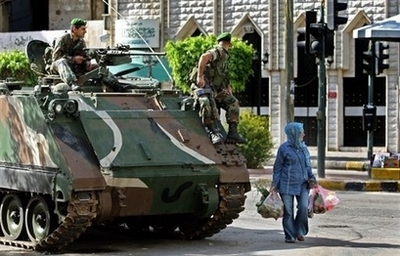
A Muslim woman crosses a street guarded by Lebanese army soldiers in Beirut. A precarious calm returned to Lebanon on Tuesday after the army warned it was ready to use force to restore order after six days of sectarian bloodshed that have shaken the nation.(AFP/Hassan Ammar)
AFP via Yahoo! News – 28 minutes ago
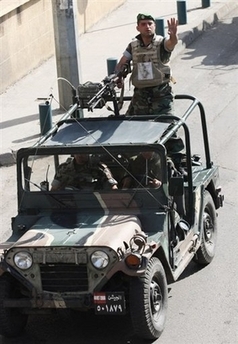
A Lebanese soldier patrols the streets of Beirut. A precarious calm returned to Lebanon on Tuesday after the army warned it was ready to use force to restore order after six days of sectarian bloodshed that have shaken the nation.(AFP/Hassan Ammar)
AFP via Yahoo! News – 28 minutes ago
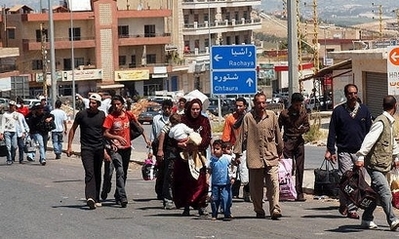
Syrians and Lebanese cross the Lebanese-Syrian border at al-Masnaa crossing point in the Bekaa valley east Lebanon. A precarious calm returned to Lebanon on Tuesday after the army warned it was ready to use force to restore order after six days of sectarian bloodshed that have shaken the nation.(AFP)
AFP via Yahoo! News – 28 minutes ago
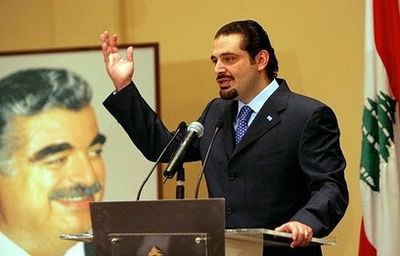
Saad Hariri, leader of the Lebanese parliamentary majority, speaks during a press conference in Beirut. Hariri vowed that the ruling coalition will not negotiate with Hezbollah with a gun pointed to its head or surrender to its allies Syria and Iran.(AFP/Anwar Amro)
AFP via Yahoo! News – 28 minutes ago
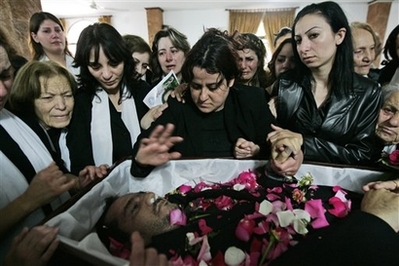
Souad al-Souki, right, center, waves to her dead husband Amine Chafik al-Souki, a Druze man killed in Sunday clashes between pro-government supporters of Druse leader Walid Jumblatt and Shiite gunmen and their allies in Chouweifat south of Beirut, Lebanon, during his funeral procession, Tuesday May 13, 2008. Lebanese troops moved into tense areas around the country Tuesday, hours after the military announced it will use force if needed to impose law and order. (AP Photo/Lefteris Pitarakis)
AP via Yahoo! News – May 13 10:18 AM
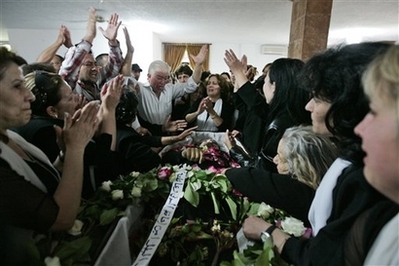
Relatives chant slogans as they mourn around the body of Amine Chafik al-Souki, a Druse man killed in Sunday clashes between pro-government supporters of Druse leader Walid Jumblatt and Shiite gunmen and their allies in Chouweifat south of Beirut, Lebanon, during his funeral procession, Tuesday May 13, 2008
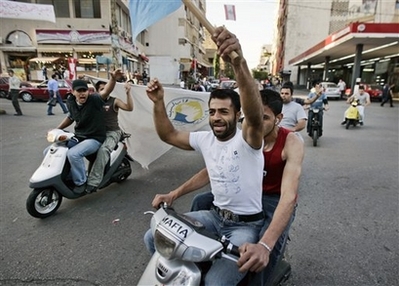
Supporters of Sunni leader Saad Hariri and leader of the parliamentary majority, celebrate in a Sunni neighborhood, after his speech at a press conference in Beirut, Lebanon, Tuesday, May 13, 2008. Speaking for the first time since he was besieged in his residence in Beirut’s Muslim sector protected by Lebanese troops, Hariri said he supports canceling the Cabinet decisions that sparked clashes in the country ‘to save Lebanon.’ (AP Photo/Lefteris Pitarakis)
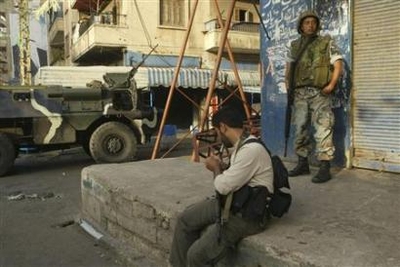
A Sunni Muslim gunman sits near a Lebanese soldier after clashes in a street in Tripoli, northern Lebanon May 12, 2008. (Omar Ibrahim/Reuters)
Reuters via Yahoo! News – May 13 9:17 AM
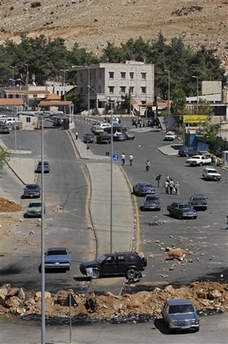
A barricade blocks the Lebanese-Syrian border crossing near Al-Masna, Lebanon, Tuesday, May 13, 2008. Road blocks, erected by anti-government factions, and clashes have blocked the road at Al-Masna, the key crossing on the Lebanon-Syria border. Gunmen opened fire in the region on cars on several occasions over the past two days. (AP Photo/Bela Szandelszky)
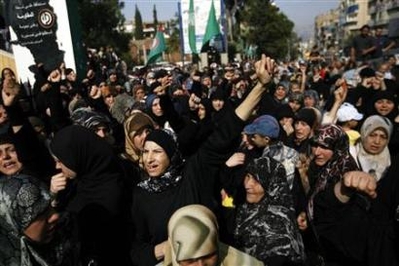
Lebanese women and other Hezbollah supporters shout during a funeral for two of their comrades in the south of Beirut May 12, 2008. (Damir Sagolj/Reuters)
Reuters via Yahoo
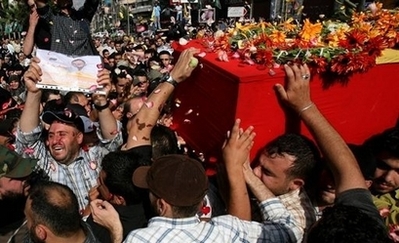
Hezbollah militants carry the coffin of a comrade during his funeral in southern Beirut. A precarious calm has returned to Lebanon after the army warned it was ready to use force to restore order after six days of sectarian bloodshed that have shaken the nation.(AFP/Hassan Ammar)
AFP via Yahoo! News – May 13 8:28 AM
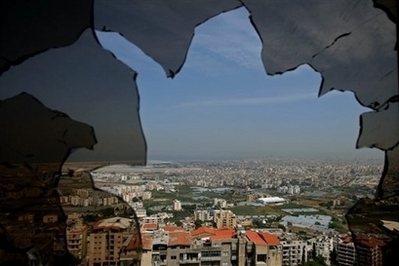
The town of Shwayfat and Beirut seen through a shattered window in an appartment southeast of Beirut. A precarious calm has returned to Lebanon after the army warned it was ready to use force to restore order after six days of sectarian bloodshed that have shaken the nation.(AFP/Patrick Baz)
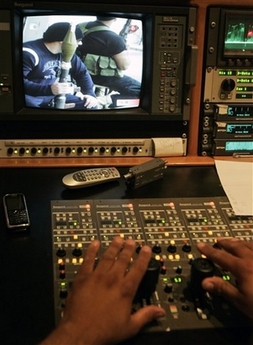
Technicians work in the sound studio of Future TV in Beirut, Lebanon, Tuesday, May 13, 2008. Lebanon‘s Future TV station is back on air four days
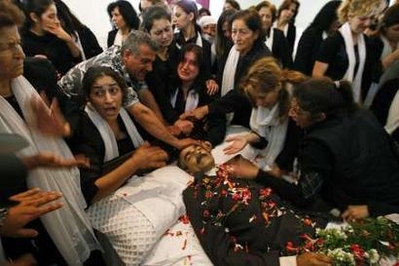
Relatives and friends mourn over the dead body of a Druze man killed in recent clashes, before his funeral in Shwayfat area in Mount Lebanon near Beirut May 13, 2008.
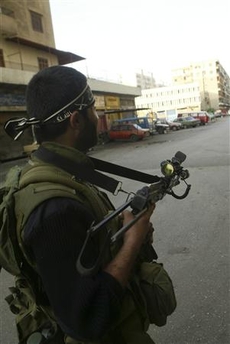
A Sunni Muslim gunman walks on a street in Tripoli, northern Lebanon May 12, 2008. (Omar Ibrahim/Reuters)
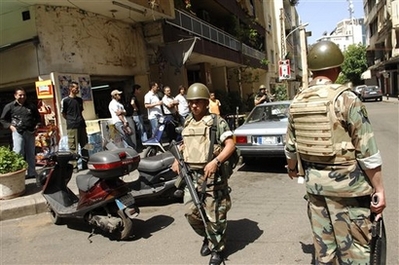
Lebanese soldiers patrol the streets as people look on in Beirut, Lebanon, Tuesday, May 13, 2008. The Lebanese army expanded its troop deployment to several tense areas around the country Tuesday, hours after it said soldiers will use force if needed to impose order after almost a week of clashes between the Western-backed government and Hezbollah-led opposition. (AP Photo/Mahmoud Tawil)
AP via Yahoo! News – May 13 3:37 AM
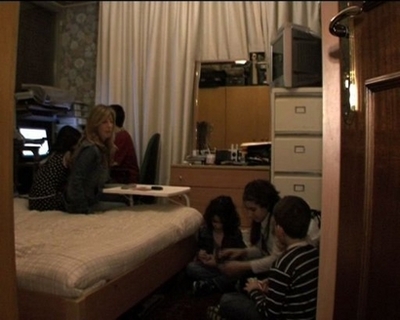
Deadly clashes between Sunni supporters of Lebanon‘s government and mainly Shiite rivals from the Hezbollah-led opposition have forced many families from their homes in west Beirut. Portrayal of a broken family.(AFPTV)
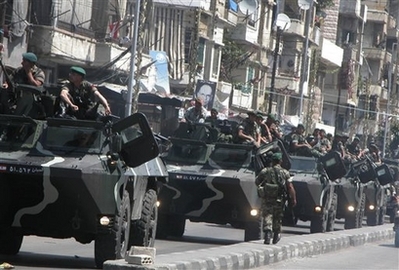
Lebanese troops atop armored personnel carriers patrol the streets in the northern city of Tripoli, Lebanon, Tuesday, May 13, 2008.
To view pictures of DAY 6 please click here



